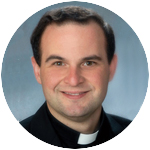
Father Eric J. Banecker
Arequipa, Peru is a fascinating place. In the summer I spent there studying Spanish in 2014, I grew to love its friendly people, its delicious local dishes like rocotto relleno, and the city’s beautiful mix of influences from indigenous culture and Spanish missionaries, all with many amenities of modern life.
It has its quirks too. Driving around was the kind of event that brought one face-to-face with mortality. There weren’t really any stop signs that I can recall. There were very few traffic lights. And as one got to the outskirts of town, herds of livestock would frequently rumble right past a few cars.
The beautiful churches in the Plaza de Armas were filled with devout Catholics each day, though I did laugh when I realized the instrumental music being played in one church between Masses was by none other than the Beatles.
[hotblock]
I also became familiar with many souvenir shops during that summer. Now, those who know me know that I’m not exactly one for souvenirs. But it became our nightly pastime, and we were led by an intrepid Augustinian friar named Father Gus Esposito.
Father Gus spent a month with us in Peru, helping us navigate life in another country and assisting with our Spanish study. He also celebrated Mass for us, led us in Evening Prayer, and took us to dinner when we were tired of the food at our residence. He also kept us laughing and made sure we weren’t too stressed or anxious. And yes, he dragged us along with him into those shops.
Occasionally, we would wander into a bodega to purchase some delicious local food or fresh rolls. But most of the time it was those souvenir shops. He was on a mission to find a small gift for every one of his nieces and nephews on his small allowance given by the Augustinian community. He would hold up onesies that had “Contigo Peru” written on the front, asking what we thought. At the beginning, my classmates and I tried giving our honest opinion. After a while, I just started saying whatever I thought would get us out of the store faster.
I’ve been laughing to myself about that summer in recent days after the death of Father Esposito from COVID-19 last week. Here was a man who in simple, ordinary ways radiated the gentleness and joy of Christ. So many people are remembering him fondly this week – not because of some high-profile public ministry, but really because of the opposite: because he was always, entirely himself. He was a man comfortable in his own skin, without artifice or a “public persona” that many of us feel so necessary to maintain. And most of all, he was always a priest.
Many of us continue to be shaken to the core by recent events in our country: the coronavirus and its devastating effects on our economy (a reality we’ve only begun to experience), the rise of deaths of despair, the summer protests, and now the insurrection against our country’s legislative branch.
Physically, emotionally, and spiritually, we are a deeply ill society. And while I do not think a massive implosion is likely, I think a slow descent into a new dark age is very possible, and perhaps we’re already in the middle of it.
Either way, it is not for us to say from our limited vantage point where the river of history is leading us. We do not get to decide the time and manner of our birth. All we can do is respond with God’s grace to the challenges of the hour. St. Augustine would tell us as much. And, I suspect, Father Augustine Esposito, O.S.A., would agree.
St. Augustine too lived at an inflection point in history. In many ways, he represents in himself the bridge, at least in the West, between antiquity and the medieval age. And he understood that in the midst of a cultural wasteland, the duty of a Christian is to live one’s faith boldly and according to one’s state in life.
Most of us will not live in such a public way as St. Augustine. People 1,500 years from now probably will not know our names or read anything we’ve written. But nevertheless, a thousand simple, ordinary lives lived boldly for God can do a tremendous amount of good in restoring a civilization. And is there any doubt at this point that such at-the-root renewal is necessary?
Well then, let us begin again: in our churches and monasteries, in our homes and neighborhoods. And yes, even in the souvenir shops in the hidden alleys of our world, where those whom Christ called blessed for being poor in spirit radiate the light and joy of the Gospel while examining the price tag on a set of wooden rosaries.
***
Father Eric J. Banecker is parochial administrator of St. Francis de Sales Parish, Philadelphia.


Share this story